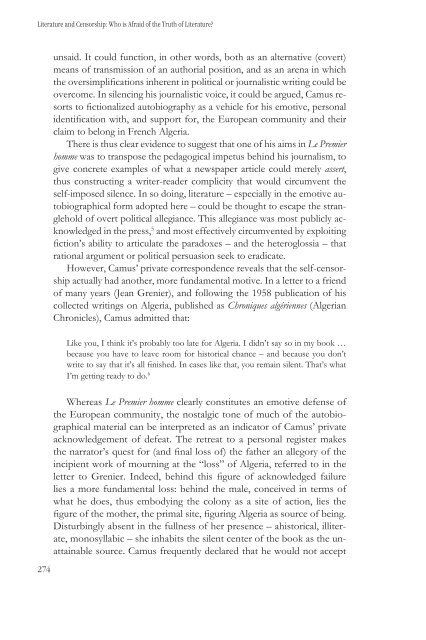Literatura in cenzura - Društvo za primerjalno književnost - ZRC SAZU
Literatura in cenzura - Društvo za primerjalno književnost - ZRC SAZU
Literatura in cenzura - Društvo za primerjalno književnost - ZRC SAZU
- No tags were found...
Create successful ePaper yourself
Turn your PDF publications into a flip-book with our unique Google optimized e-Paper software.
Literature and Censorship: Who is Afraid of the Truth of Literature?unsaid. It could function, <strong>in</strong> other words, both as an alternative (covert)means of transmission of an authorial position, and as an arena <strong>in</strong> whichthe oversimplifications <strong>in</strong>herent <strong>in</strong> political or journalistic writ<strong>in</strong>g could beovercome. In silenc<strong>in</strong>g his journalistic voice, it could be argued, Camus resortsto fictionalized autobiography as a vehicle for his emotive, personalidentification with, and support for, the European community and theirclaim to belong <strong>in</strong> French Algeria.There is thus clear evidence to suggest that one of his aims <strong>in</strong> Le Premierhomme was to transpose the pedagogical impetus beh<strong>in</strong>d his journalism, togive concrete examples of what a newspaper article could merely assert,thus construct<strong>in</strong>g a writer-reader complicity that would circumvent theself-imposed silence. In so do<strong>in</strong>g, literature – especially <strong>in</strong> the emotive autobiographicalform adopted here – could be thought to escape the strangleholdof overt political allegiance. This allegiance was most publicly acknowledged<strong>in</strong> the press, 5 and most effectively circumvented by exploit<strong>in</strong>gfiction’s ability to articulate the paradoxes – and the heteroglossia – thatrational argument or political persuasion seek to eradicate.However, Camus’ private correspondence reveals that the self-censorshipactually had another, more fundamental motive. In a letter to a friendof many years (Jean Grenier), and follow<strong>in</strong>g the 1958 publication of hiscollected writ<strong>in</strong>gs on Algeria, published as Chroniques algériennes (AlgerianChronicles), Camus admitted that:Like you, I th<strong>in</strong>k it’s probably too late for Algeria. I didn’t say so <strong>in</strong> my book …because you have to leave room for historical chance – and because you don’twrite to say that it’s all f<strong>in</strong>ished. In cases like that, you rema<strong>in</strong> silent. That’s whatI’m gett<strong>in</strong>g ready to do. 6274Whereas Le Premier homme clearly constitutes an emotive defense ofthe European community, the nostalgic tone of much of the autobiographicalmaterial can be <strong>in</strong>terpreted as an <strong>in</strong>dicator of Camus’ privateacknowledgement of defeat. The retreat to a personal register makesthe narrator’s quest for (and f<strong>in</strong>al loss of) the father an allegory of the<strong>in</strong>cipient work of mourn<strong>in</strong>g at the “loss” of Algeria, referred to <strong>in</strong> theletter to Grenier. Indeed, beh<strong>in</strong>d this figure of acknowledged failurelies a more fundamental loss: beh<strong>in</strong>d the male, conceived <strong>in</strong> terms ofwhat he does, thus embody<strong>in</strong>g the colony as a site of action, lies thefigure of the mother, the primal site, figur<strong>in</strong>g Algeria as source of be<strong>in</strong>g.Disturb<strong>in</strong>gly absent <strong>in</strong> the fullness of her presence – ahistorical, illiterate,monosyllabic – she <strong>in</strong>habits the silent center of the book as the unatta<strong>in</strong>ablesource. Camus frequently declared that he would not accept
















